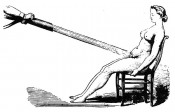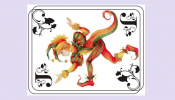Author: ceciliajwugmail-com
Matthew Oyer: Hysteria and the Psychoanalytic Act
“The history of hysteria spans nearly four thousand years: four thousand years of the wilderness of women’s bodies and of manifest destiny, or the attempts of men to push ever further the boundaries of the frontier, four thousand years of shame, of defiance, four thousand years of theater, of desire’s sting and the “infection of the Idea” (Badiou, 2013). Hysteria, from the Greek hystérā, wom...
Feminine Pathologies: An EJP Special Edition edited by Fernando Castrillon and Jamieson Webster
“Of course, what is lost in this conception of hysteria is precisely one of its most fundamental characteristics; hysteria moves and grows beyond the confines of whatever conceptual grid we try to fit it into. If it’s not here, now, it’s there; wherever we have made there out to be (Victorian era, “pain clinics”, fibromyalgia, eating disorders). To listen to and for hysteria is to move, with...
Claude-Noële Pickmann: Suppléance by the Symptom: A Case of Anorexia
“The feminine Oedipal structure as Freud discerned it in his young hysteric patients in the first half of the twentieth century has taught us that the question “what is a woman?” is first posed by a girl to her mother. Later, upon finding that the maternal response has only misled her, she chooses to pose the question to her father, as if, in the course of her searching, she had the present...
Patricia Gherovici & Jamieson Webster: Observations from Working with Female Obsessionals
“Where have all the beautiful hysterics gone? Lacan once asked. Is it possible that there may have been a shift from obsessionality as a defining core feature of male neurosis, what Freud calls a “preference” or “choice”, to obsessionality as a veneer that covers over hysteria in women as much as men. We would like to offer some observations and speculations from our clinical practice in the...
Marc Strauss in Conversation with Das Unbehagen on Psychoanalysis and the Obsessional
If we want to speak of female obsessional neurosis we first have to know what obsessional neurosis is as such. This is not an easy question, because even the most characteristic symptom, such as the ritual or OCD, as it is called nowadays, belongs to the most different personalities. Indeed, what does someone who cries all day in thought of her dead father have in common with a person who cannot l...
Manya Steinkoler: When dumbness, or unbehagen before the master, becomes “Shakespeak,” comradery and joy in shared lack
“I taught Shakespeare’s Coriolanus this summer in an Introduction to Literature course at a community college. Students from Azerbaijan, Albania, Japan, Israel, Italy, Bangladesh, China, the Philippines, Mexico, the south Bronx, and even two heavily tattooed Iraq war veterans still in their twenties wrestled with this late Shakespearean masterpiece. The jumble of accents, cultural ideologies...
David Lichtenstein on the formation of Das Unbehagen
“In late March 2012, about 30 psychoanalysts, psychoanalytic students, and candidates from several different institutions and affiliations in New York, a group composed for the most part of those who are nowadays referred to as early career professionals, gathered to talk about the contemporary state of psychoanalytic formation and training. They met under the signifier Unbehagen, a referenc...













